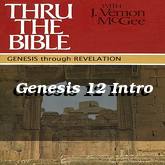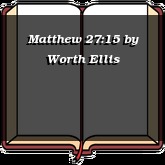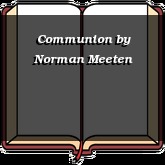"The Lord is my light and my salvation; whom shall I fear? the Lord is the strength of my life; of whom shall I be afraid?"
—Psalms 27:1
Evening Thought
"The Lord is my light and my salvation." Here is personal interest, "my light," "my salvation;" the soul is assured of it, and therefore declares it boldly. Into the soul at the new birth divine light is poured as the precursor of salvation; where there is not enough light to reveal our own darkness and to make us long for the Lord Jesus, there is no evidence of salvation. After conversion our God is our joy, comfort, guide, teacher, and in every sense our light: he is light within, light around, light reflected from us, and light to be revealed to us. Note, it is not said merely that the Lord gives light, but that he is light; nor that he gives salvation, but that he is salvation; he, then, who by faith has laid hold upon God, has all covenant blessings in his possession. This being made sure as a fact, the argument drawn from it is put in the form of a question, "Whom shall I fear?" A question which is its own answer. The powers of darkness are not to be feared, for the Lord, our light, destroys them; and the damnation of hell is not to be dreaded by us, for the Lord is our salvation. This is a very different challenge from that of boastful Goliath, for it rests, not upon the conceited vigour of an arm of flesh, but upon the real power of the omnipotent I AM. "The Lord is the strength of my life." Here is a third glowing epithet, to show that the writer's hope was fastened with a threefold cord which could not be broken. We may well accumulate terms of praise where the Lord lavishes deeds of grace. Our life derives all its strength from God; and if he deigns to make us strong, we cannot be weakened by all the machinations of the adversary. "Of whom shall I be afraid?" The bold question looks into the future as well as the present. "If God be for us," who can be against us, either now or in time to come?
Ⓒ 1996-2018 Heartlight, Inc. This material may not be reproduced in part or whole for commercial use without written consent. Written by Charles H. Spurgeon.

Continue reading...
—Psalms 27:1
Evening Thought
"The Lord is my light and my salvation." Here is personal interest, "my light," "my salvation;" the soul is assured of it, and therefore declares it boldly. Into the soul at the new birth divine light is poured as the precursor of salvation; where there is not enough light to reveal our own darkness and to make us long for the Lord Jesus, there is no evidence of salvation. After conversion our God is our joy, comfort, guide, teacher, and in every sense our light: he is light within, light around, light reflected from us, and light to be revealed to us. Note, it is not said merely that the Lord gives light, but that he is light; nor that he gives salvation, but that he is salvation; he, then, who by faith has laid hold upon God, has all covenant blessings in his possession. This being made sure as a fact, the argument drawn from it is put in the form of a question, "Whom shall I fear?" A question which is its own answer. The powers of darkness are not to be feared, for the Lord, our light, destroys them; and the damnation of hell is not to be dreaded by us, for the Lord is our salvation. This is a very different challenge from that of boastful Goliath, for it rests, not upon the conceited vigour of an arm of flesh, but upon the real power of the omnipotent I AM. "The Lord is the strength of my life." Here is a third glowing epithet, to show that the writer's hope was fastened with a threefold cord which could not be broken. We may well accumulate terms of praise where the Lord lavishes deeds of grace. Our life derives all its strength from God; and if he deigns to make us strong, we cannot be weakened by all the machinations of the adversary. "Of whom shall I be afraid?" The bold question looks into the future as well as the present. "If God be for us," who can be against us, either now or in time to come?
Ⓒ 1996-2018 Heartlight, Inc. This material may not be reproduced in part or whole for commercial use without written consent. Written by Charles H. Spurgeon.
Continue reading...


 Hello everyone! Let's lift up @RoshanDsouza who's facing financial hurdles,
Hello everyone! Let's lift up @RoshanDsouza who's facing financial hurdles,  Also,
Also, 


 **Prayer Board Update!**
**Prayer Board Update!**  Let's lift up
Let's lift up 






 ** Let's lift up
** Let's lift up 

